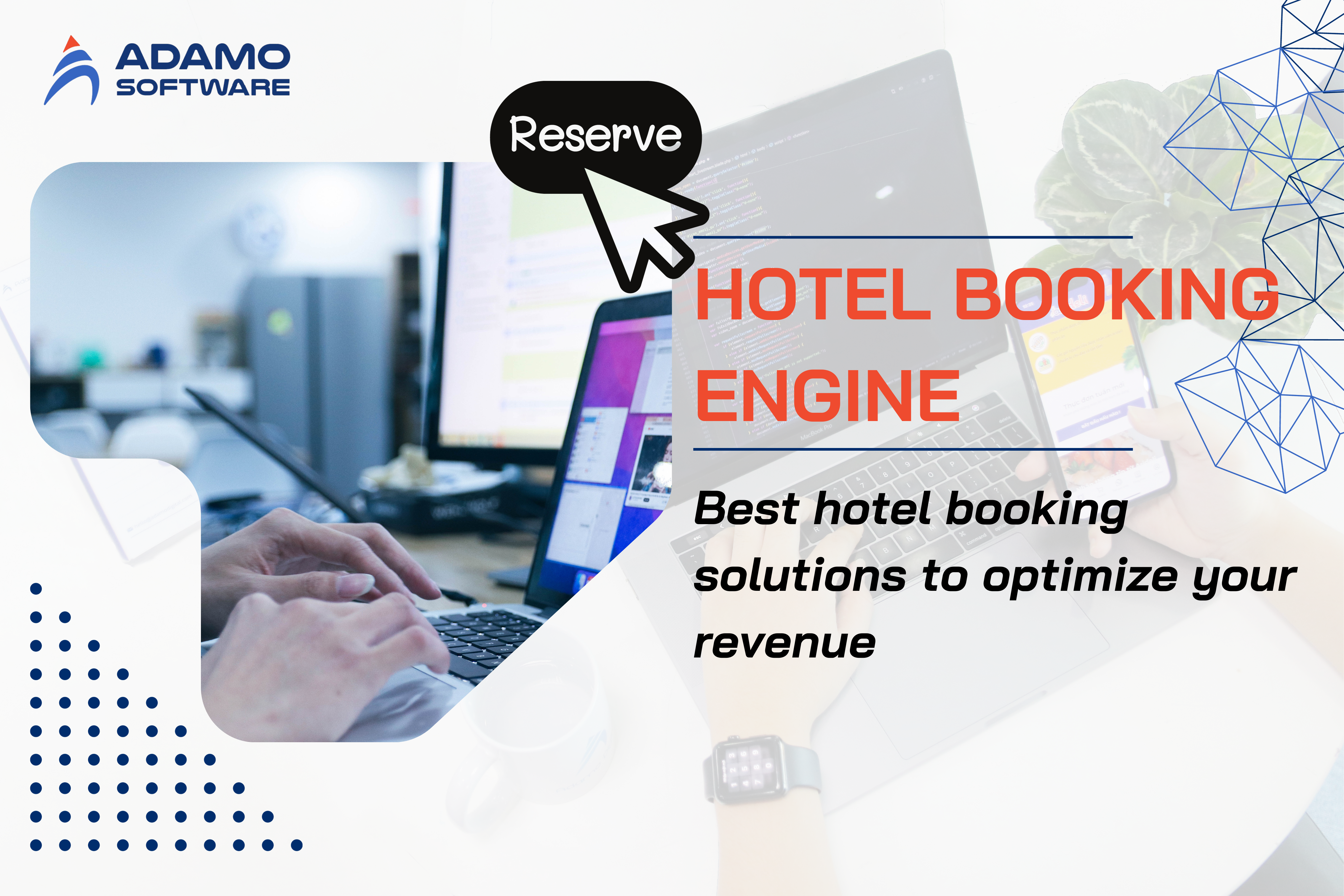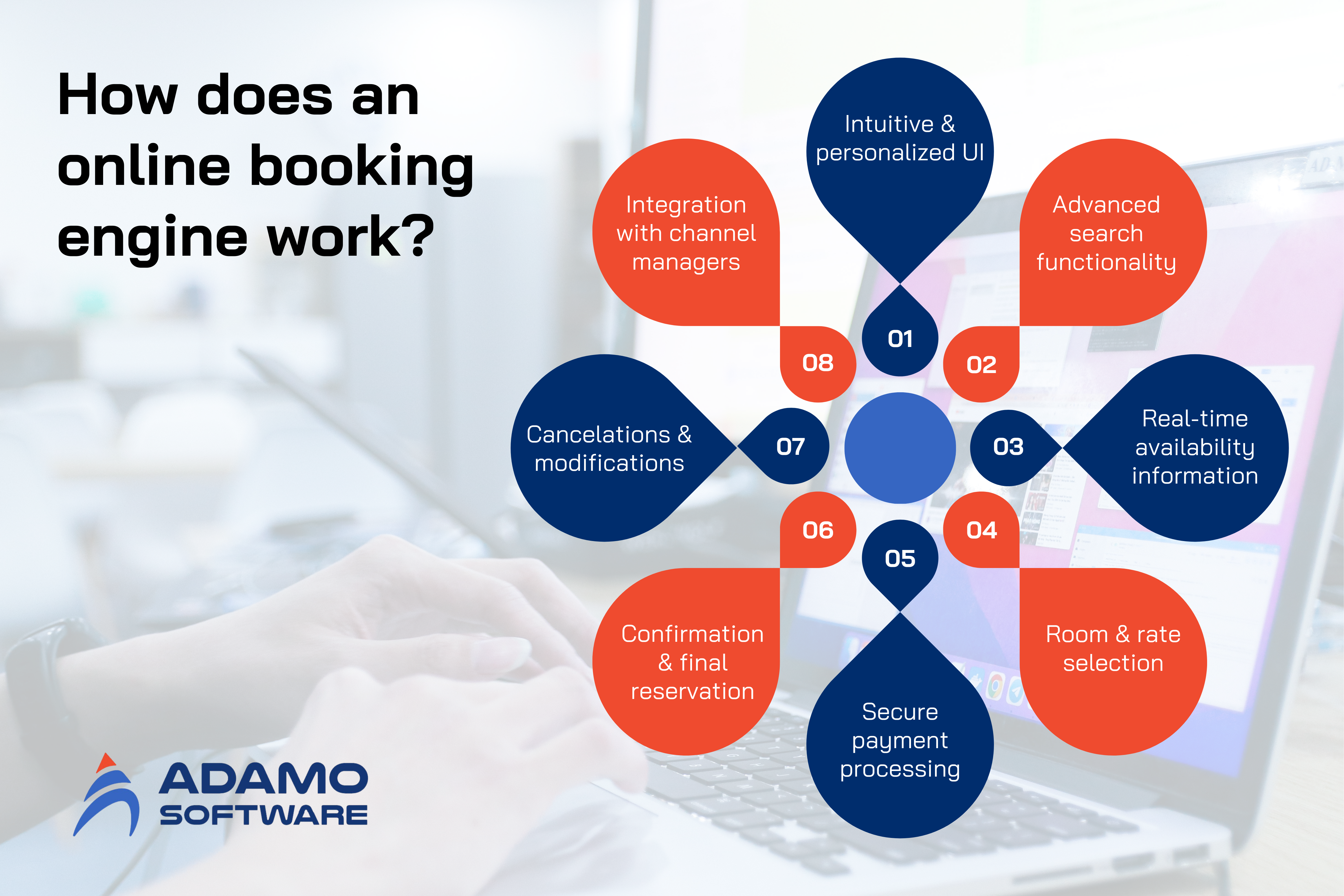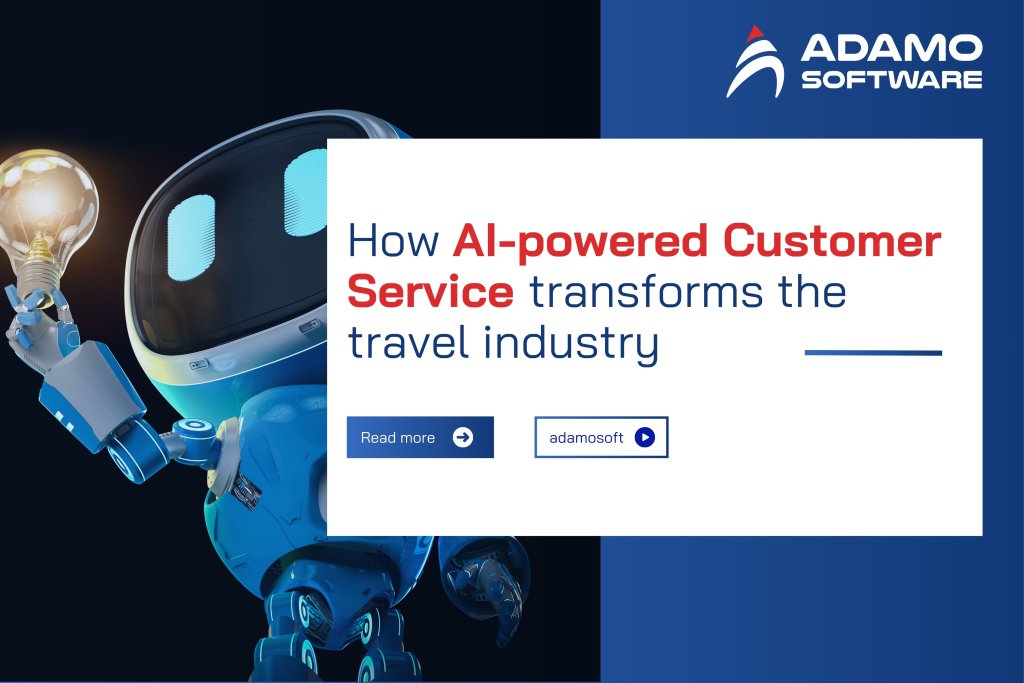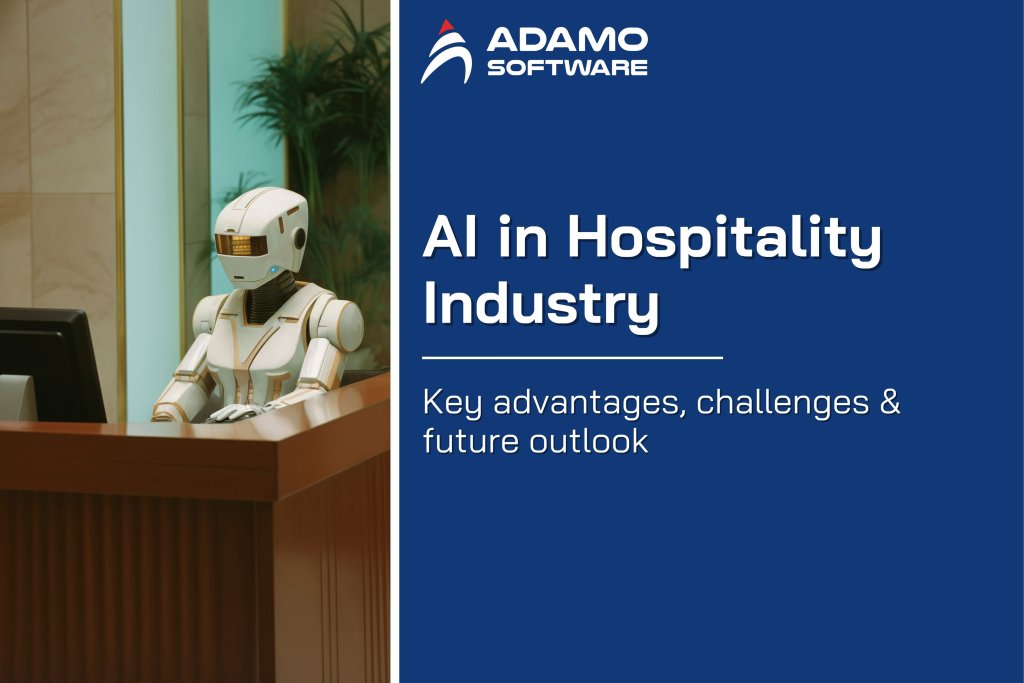What is a hotel booking engine? Best hotel booking solutions to optimize your revenue

A hotel booking engine is a valuable tool that enriches the functionality of your website and improves the overall experience for your guests. Check it out.
In the past few years, more and more hotels and other lodging companies have focused on getting new reservations for as little money as possible. There are a lot of places that have built a successful direct reservations channel by using a hotel booking engine and improving their sales and marketing.
Modern travelers have come to expect an easy and smooth booking process. The website of your hotel is frequently the first point of contact between potential guests and your facility. Therefore, a hotel booking engine is a must-have tool for meeting these expectations and improving your hotel’s efficiency.
I. What is the booking engine for hotels?
A hotel booking engine, also known as an online booking system or reservation system, is software that allows clients to book hotel rooms directly through the hotel’s website. This type of system can be integrated into the hotel’s website, or it can be accessed through a link on the website.
Customers save time and effort by not having to browse various websites for available rooms when using a hotel booking engine. Moreover, it allows hotels to offer rooms directly to customers without going via a third-party website.
The software usually has a search engine that lets customers choose the times they want to stay, the type of room they want, and other options. After that, the hotel booking engine looks for open rooms that meet the customer’s needs and shows them the results. Then, the customer can pick out the room they want and finish the booking process through the hotel booking engine. Moreover, customers can usually see the details of their ticket and change or cancel it if necessary.
Booking tools are getting more and more popular as more and more people book their stays online. Looking to purchase a hotel booking engine to make more sales? Then, you’ve come to the right place. We’ve put together a full guide that explains why you need a booking engine for your hotel. So, let’s dive in!
II. Why are hotel reservation booking engines important?
1. Guest convenience
In today’s fast-paced world, travelers appreciate the convenience of self-service. A hotel booking engine streamlines the booking process by allowing guests to check hotel availability, and cost, and make bookings without the need for a direct connection.
2. Trust and Security
Booking engines handle credit card payments and securely store guest data. This builds trust among guests by protecting the security of their personal and financial information.
3. Efficiency
Online bookings reduce the need for time-consuming back-and-forth communication, as well as phone or email tags. As a result, guests may make bookings faster, resulting in a more seamless booking experience.
4. Direct booking perks
When booking directly through a hotel’s website, many travelers expect extra perks such as special offers or loyalty rewards. You can provide these incentives to your visitors while avoiding third-party commissions by encouraging direct bookings.
5. Professionalism
The absence of an online booking option on your website may create the impression that you are disorganized. When booking online, modern guests expect a professional and user-friendly experience.
III. How does an online booking engine work?

Part 1: Intuitive and personalized user interface
The hotel booking engine starts working its magic by displaying a user-friendly interface on the hotel’s website or a third-party travel platform.
When creating a user interface, keep it simple, uncluttered, and easy to understand. To help visitors through the booking process, use a straightforward layout with clear headings, brief text, and intuitive icons. Users can use the hotel booking engine by clicking on noticeable buttons or links like “Book Now,” “Reservations,” or “Check Availability,” which will redirect them to a hotel website.
Part 2: Advanced search functionalities
Once on the booking engine, users enter their trip data, such as check-in and check-out dates, the number of guests, and room preferences (e.g., single, double, suite). The booking engine searches the hotel’s database for up-to-the-minute information on room availability, pricing, and any ongoing promotions or discounts.
Create consistent and user-friendly categories and filters to assist consumers in efficiently refining their search results. Like most major travel meta-search engines, the group filters logically into categories such as price range, star rating, amenities, distance from landmarks, and user ratings.
Use NPL approaches to comprehend natural language user questions. Instead of rigid keyword-based searches, this enables customers to search for hotels using more conventional and flexible terms. In addition, use machine learning techniques to assess user behavior and preferences. Or use this information to customize search results based on previous interactions, chosen hotel characteristics, and previous reservations.
Part 3: Real-time availability information
To check room availability for the supplied dates, the booking engine talks with the hotel’s property management system (PMS). The PMS is the hotel’s central system for managing reservations, room inventories, and other operations.
Real-time availability ensures that consumers obtain accurate and up-to-date room availability information. This helps users avoid disappointment due to fully booked accommodations or misleading availability due to outdated data. Real-time availability ensures that the number of available rooms for booking corresponds to the actual hotel inventory, eliminating the danger of overbooking.
Part 4: Room and rate selection
The hotel booking engine presents a list of available rooms, together with their rates and amenities, based on the search criteria.
Customers can choose from various room and pricing options to find the greatest value for their money. They can evaluate different room types, amenities, and tariffs to make an informed decision that fits their budget. After that, customers may book a room that matches their quality and comfort standards when they have access to specific accommodation information, such as images, amenities, and user reviews.
Part 5: Secure payment processing
After selecting their preferred room, the user proceeds to the payment stage. To process credit card transactions and other payment methods, the booking engine employs secure payment gateways. It ensures that critical consumer information, such as credit card numbers and personal information, is encrypted and safeguarded from unwanted access.
Customers are increasingly hesitant to provide their financial information online in the digital era. An online booking engine with strong security safeguards builds trust and credibility with users, enabling them to make confident bookings.
Part 6: Confirmation and final reservation
Following the successful processing of the payment, the hotel booking engine generates a confirmation page presenting the reservation details, including the booking reference number, total amount, and other vital information. At the same time, the system sends the new reservation to the hotel’s PMS and marks the selected room as booked.
Customers like receiving rapid confirmation of their reservations. The final reservation page should immediately indicate that their reservation was successful and reassure them that their preferred room has been reserved. However, the confirmation page can be an excellent spot to offer additional services or upgrades, such as breakfast packages, airport transfers, or spa treatments. These upselling options can improve the entire guest experience while also increasing hotel revenue.
Part 7: Cancellations and modifications
If users need to change or cancel their reservations, they can usually do so through the booking engine, subject to the hotel’s regulations. The hotel booking engine adjusts the PMS accordingly, freeing up canceled rooms and notifying the hotel of any changes.
Customers can adjust their trip plans when circumstances change by providing a user-friendly cancellation and modification process. This adaptability improves the user experience overall. A simple cancellation process decreases the probability of customers turning to chargebacks or disputes, which can result in revenue loss for both hotels and booking platforms.
Part 8: Integration with channel managers
The hotel booking engine can be coupled with a hotel channel manager in circumstances when hotels work with several online travel agents (OTAs) or third-party booking platforms.
Hotels can use channel managers to organize and sync their room inventory across numerous booking systems. This real-time hotel inventory management guarantees that available rooms and rates are constant across all channels, avoiding the risk of overbooking or underselling. Integration with a channel manager simplifies the management of hotel rates. To ensure competitive pricing across all channels, hotels might implement dynamic pricing strategies based on demand, seasonality, and market conditions.
IV. Key features of booking engine software
1. 24/7 availability
The hotel booking engine is like an online store that’s open 24 hours a day, seven days a week. Therefore, people from anywhere can use it and make a reservation. If you can’t always automatically accept bookings, your vacancy rate will go down, and you’ll lose business. For your direct reservations route to stay strong, uptime is also very important.
2. Flawless booking experience
Like any other online store, people who visit your website expect the registration process to be simple, quick, and easy. For a smooth user experience, simplicity and clear steps are very important. The most important steps in the buying process should be easy to understand: look up times and room rates, choose a room, and make a safe payment.
Many smartphone shoppers are more likely to buy something if they can easily find their way to the checkout. As a result, to keep travelers from getting confused, don’t add too many steps and choices.
3. Better integrations
When it comes to room availability, rate types, and prices, your hotel booking engine needs to be reliable. Therefore, your Channel Manager and PMS must work together in real-time. Businesses won’t have to worry about overbooking, price mistakes, or moving data from one software to another manually. Google Analytics and plugins for social media bookings are two other very important connections.
4. Easy payment processing
An online payment method makes the booking process easy for both the guest and the property. These days, travelers like to use credit cards to pay online and get fast confirmation of their reservations. You won’t have to manually change bookings or check credit card status with this method either.
5. Mobile-friendly
Look for a hotel booking engine that loads quickly and works well on mobile devices. The way we buy things has changed because of smartphones. No matter what device we’re using, we now expect to be able to book things on our own. There are numbers from Google that show that mobile searches for trips have grown every year. If your website doesn’t work right, you could lose sales.
6. Extra services & promo codes
Your website is the best place for your guests to book special rates, find last-minute deals, and use coupon codes. Furthermore, it’s the best place for you to make more money by upselling, which means you can offer extras like tours, activities, and more. If your hotel booking engine was made with promotional features in mind, it would be much easier to handle special rates and deals for partners like tour operators, conference centers, business travelers, and more.
7. Multi-currency & multi-languages
Set up your property to attract an international market by allowing customers to book reservations in their favorite language and pay in their preferred currency.
8. SSL protection
It’s also important to make sure that your provider follows PCI DSS Compliance and Strong Customer Authentication (SCA) rules. This will keep your data and your guests’ data safe.
9. Design & customization
Choose a hotel booking engine that has adjustable options or the ability to apply custom CSS if necessary. Aside from brand awareness, the appearance and feel of your website will help to provide a consistent guest experience. Choose a design with rich graphics to correctly highlight your rooms, amenities, and location, as your hotel website’s goal is to inspire guests.
V. Top hotel booking system provider in the market
1. How to integrate a hotel booking engine into your website
Your hotel’s systems must communicate and synchronize well. Consider the following while optimizing your website for possible visitors:
– Check that your online booking engine is in sync with your website.
– Make a conspicuous ‘Book Now’ button visible on your website.
– Maintain design, functionality, and performance consistency between your website and booking engine.
– Use HTTPS and an SSL certificate that is up to date to secure your website.
2. How to use a hotel booking engine on Facebook
Your hotel booking engine provider should be able to integrate your booking engine with your Facebook profile as well.
On your business page, you may include a call-to-action that directs visitors to your booking page. This implies you can accept direct bookings without requiring the guest to visit your website.
VI. Integrating booking engines with other hotel management software
1. Differences between booking engines and hotel reservation booking engines
People often use the words “booking engine” and “hotel reservation system” to refer to the same thing. The difference is that a booking engine is an app or piece of software that takes the guest’s information and completes the online order. Coupled with an integrated PMS, it can handle all bookings and guest information.
On the other hand, a hotel reservation system is a piece of software that hotels use to handle all aspects of a reservation. This includes changing or canceling a booking, adding charges and notes, splitting folios, and many other things.
2. Integrating booking engines and channel manager software
Using channel manager software, channel management is the process of keeping room listings up to date on multiple online marketing sites. Since your website is the best way to get straight bookings, it should always show the most accurate and up-to-date information. This also goes for your listing websites.
When picking a booking engine, make sure it works with a channel manager in real-time. This will make sure that all of your property information, prices, and availability are correct and up to date. A channel manager will make sure that your price and calendar are always up to date with your booking engine. This will help you avoid making mistakes like overbooking and other mistakes that happen when you do things manually.
3. Booking engines with the property management system
You’ll use a PMS to govern and organize every part of your hotel business to manage and scale it. The ideal hotel PMS boosts efficiency, saves expenses, and improves visitor satisfaction. If you choose planning software that works with your property management system, you won’t have to move data from one platform to another manually. You will save a lot of time by automating changes to your prices, inventory, new bookings, cancellations, credit card information, and other things.
Like a channel manager, find a PMS that syncs data with your hotel booking engine in real-time. In that manner, your PMS dashboard will immediately import a new hotel booking engine reservation, update the central calendar, and provide guest details for messaging. When your PMS changes hotel availability or rates, your hotel booking engine updates promptly.
4. All-in-one integrated hotel management software
An online payment provider, a project management system, and a channel manager are some of the most important technologies you should use with your hotel booking engine.
There is an easy way to avoid having to use different service providers for all the above tools: pick software that has a PMS, channel manager, and booking engine built in. This will make sure that data flows smoothly and in real-time.
Your ticket management will be much more flexible and effective if you use a central system that has all the tools you need. By using your hotel booking engine, a guest can reserve a place and pay right away. You will get the reservation information right away in your PMS, where you can set up an automatic booking confirmation email. Your channel manager will also update all your marketing channels right away.
You should also connect your hotel booking engine to more important hotel management tools, like a revenue management system. A revenue management system helps you set prices wisely by giving you real-time market data and letting you compare your prices to those of your competitors. It also finds new ways for you to make money. The best tools let you set rules and triggers that change prices based on a lot of different factors. This way, you can ensure that your prices are always competitive on your website and all of your connected sales platforms.
With a centralized system, it’s also easier to get strong data insights that are all in one place. You can fully control your business and make smart choices based on data if you accurately report daily transactions like payments, new revenue, market insights, and analytics about your booking channels.
VII. How to select the best hotel booking engine for you
Picking the best hotel booking engine is a very important choice for hotels because it affects their online visibility, how much money they make, and how happy their guests are. Hotels need to think about a few important things to make an informed choice.
First, the ticket engine should have an easy-to-use interface that makes things smooth for both guests and hotel staff. Real-time reports on room availability are necessary to avoid overbooking and underselling. As a result, guests can see right away what rooms are available and how much they cost.
As the number of orders made on mobile devices grows, the hotel booking engine needs to be mobile-friendly to keep up with the times. It should be simple to connect to the hotel’s property management system (PMS), channel manager, and other useful tools to make things run more smoothly and keep data management centralized.
Furthermore, a good hotel booking engine should have basic but necessary features like the ability to support multiple languages and currencies, safe payment handling, analytics tools, and ways to make the experience more unique. All these things make the user experience much better, which means more money in the bank.
In addition, the hotel needs to be able to grow and adapt to new business needs. Therefore, it needs to be able to scale up or down as needed. You should make sure that the direct hotel booking engine you pick can handle more users as your business grows.
Lastly, businesses should look at the total cost and return on investment (ROI) of each online hotel booking engine they consider. This will help them decide if the chosen method will save them money and time.
Hotels can choose a hotel booking engine that will improve the guest experience, drive business growth, and eventually help them succeed in the competitive hospitality industry if they carefully think about these factors.
You can read more solutions related to online booking engine and understand different travel and hospitality software service development that Adamo Software offer.
VIII. Explore a list of hotel booking engine
1. Cloudbeds
Cloudbeds is an all-in-one tool for managing hotels that has a powerful hotel booking engine, a PMS, and a channel manager.
This all-in-one solution makes running a hotel easier by making it easier to handle reservations, room inventory, and guest information. The best thing about the platform is that it works well with other programs. As a result, hotels can easily run their businesses from a single screen. Some problems with the system are that it can be hard to understand, which means employees may need more training, and it can be expensive, which can be a big problem for some groups.
2. Sabra SynXis
Sabre SynXis is a GDS provider that also provides a full range of technology options for hotels, including a hotel booking engine.
Its main strengths are a large distribution network, a strong technology base, and the ability to work with many travel agents around the world. Costs may be higher for smaller homes, though, and installation may need technical know-how.
3. STAAH
The cloud-based STAAH hotel distribution tool has a hotel booking engine and a channel manager to help hotels run more efficiently and get more online reservations.
The platform has a hotel booking engine that is easy to use and also works well on mobile devices. This allows guests to look for available rooms, see rates, and make straight reservations without any problems. One problem with STAAH is that it might be harder for hotel staff to learn at first. Last but not least, some users might find the interface harder to understand than with other choices.
4. SiteMinder
SiteMinder is a well-known and trusted cloud-based hotel distribution tool that offers a powerful hotel booking engine that helps properties of all sizes get more direct bookings.
A mobile-friendly design, an easy-to-use interface, and seamless merging are some of its best features. It has a lot of really useful features. However, some users may think the customization options aren’t as good as those of other providers and the price is a bit high.
5. innRoad
InnRoad is a hotel management system that has a hotel booking engine, a PMS, and a channel manager all in one.
OTAs and the hotel’s website can get real-time information on room availability and rates thanks to the platform’s integration features. One problem with innRoad is that it might take longer to learn how to use it for the first time. Furthermore, some users might find the layout harder to understand than with other providers.
6. Bookassist
The direct booking tool Bookassist is a trustworthy one that provides a full hotel booking engine as well as digital marketing services for hotels. With the platform’s help, hotels can get more direct bookings and depend less on third-party channels, which lets them keep their profit margins.
Users can easily look for available rooms, see rates, and make reservations with Bookassist’s hotel booking engine, which has an easy-to-use interface. Bookassist’s hotel booking engine works well for hotels of all sizes, but bigger companies with more complex needs may find that it lacks some advanced features or scalability options that other providers offer.
7. DirectBookingIQ
DirectBookingIQ’s hotel booking engine focuses on conversion-oriented design, offers tools for managing rate parity, and works seamlessly with several website builders.
The tool lets hotels offer special deals and packages to get guests to book directly with them, which means they don’t have to rely on third-party OTAs as much and can make more money.
IX. Is it necessary to develop a bespoke booking engine for hotels?
We should now have a pretty good idea of how useful hotel booking engines are for hotels and other companies that serve guests. Moreover, there are a lot of solutions out there for people to choose from.
But there is a different third option: a custom solution.
Having a customized hotel booking engine can be more beneficial for hotels than using a booking engine that comes out of the box.
Off-the-shelf tools might have standard features and be easy to set up, but a custom solution can work better and be able to grow to meet the needs of the hotel. With a custom hotel booking engine, hotels can completely change the user interface and experience, making sure that guests have a smooth and personalized booking process.
This amount of customization helps the hotel’s brand stand out and builds a stronger bond with its guests. A customized hotel booking engine can also work with the hotel’s current systems, like channel managers and property management systems (PMS), making operations and data management easier.
The customized method also lets hotels use advanced AI to make personalized suggestions and change prices on the fly, which increases their chances of making money even more. A custom hotel booking engine can easily grow and change with the business to meet rising demand and new travel technology trends as the hotel gets bigger.
Finally, buying a personalized hotel booking engine helps hotels provide great experiences for guests, increase direct bookings, and stay ahead in the tough hospitality industry.
Besides understanding how mobile apps in the travel and hospitality works, you also need to dive deep into digital solutions that can shape consumer behaviors in tourism and travel.
X. Adamo helps build lucrative hotel booking engines for your business
We are Adamo Software, a premier software development company in Vietnam. We strongly believe that faster-to-market software solutions, easy allocation of human resources in every project, and effective-building solutions are our key goals to deliver complicated software projects in today’s dynamic market. It allows us to build advanced software applications in a prompt time. Also, we offer clients the option of outsourcing and hiring experienced developers specializing in programming languages. Besides, we excel at travel and hospitality software, healthcare software, fintech software development, and more. If you want to develop custom apps for your business growth, do not hesitate to contact us for more discussions.





